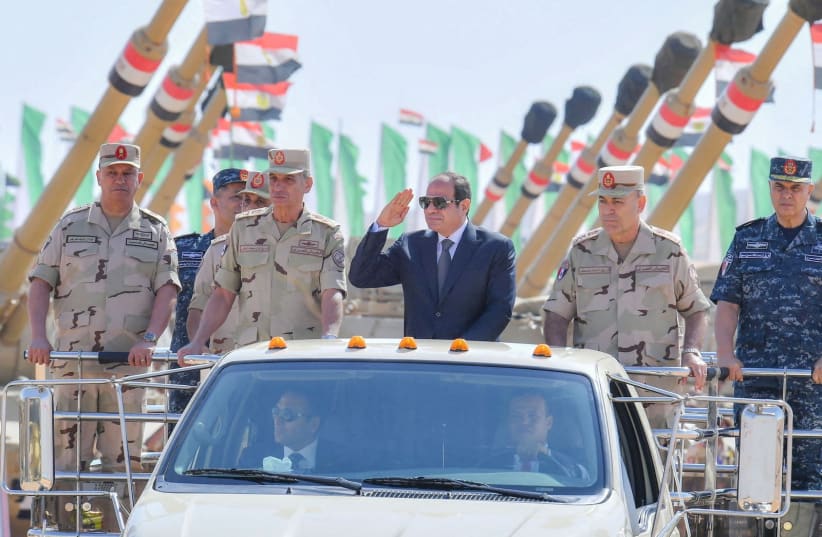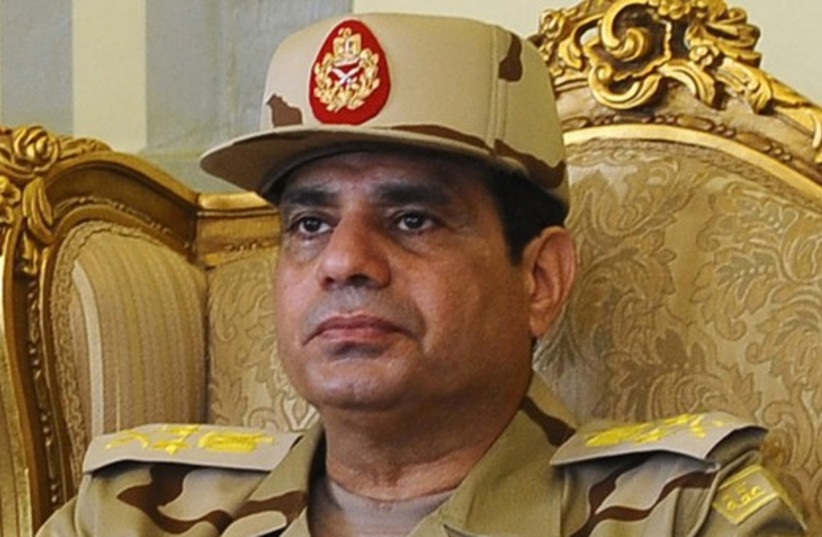As the IDF pushes deeper into Rafah they are finding tunnels and dismantling Hamas terrorist infrastructure. The offensive in Rafah was opposed by Egypt before it happened, however there have been less statements since it actually began. There remains a lack of clarity about Egypt’s overall position today and also what may have transpired in the years leading up to October 7.
It's important to begin the process of understanding how Hamas became so powerful prior to the October 7 attack. How did it stockpile so many weapons? Where did the weapons come from? Hamas manufactures many types of rockets locally, but it also acquired RPGs and other types of systems that appear to have been trafficked from abroad.
In the past Hamas smuggled weapons using tunnels in Rafah that went to Egypt. It was widely believed these tunnels were dismantled years ago. There is also a crossing between Egypt and Gaza called the Rafah crossing. Ostensibly this was only for approved types of aid entering Gaza. Israel maintained a blockade of Gaza for many years to prevent weapons entering. However, weapons did enter. In fact, Gaza may have been one of the most heavily armed places per capita in the world on October 6. If it was under blockade, how did this happen.
Egypt's role
There are going to be a lot of questions asked in coming months about Egypt’s role here. Egypt and Israel appeared to have relatively warm ties prior to October 7. Egypt’s government is opposed to the Muslim Brotherhood and Hamas has origins in the Brotherhood. Egypt also opposes terrorism. Therefore many would have concluded that Egypt opposes Hamas. However, it is less clear now what Egypt’s role has been.
To use the phrasing made famous by a former US secretary of defense, there are many “known unknowns” and “unknown knowns” regarding what transpired in Gaza with Hamas and also what Egypt’s role has been. Let’s take a look at what we know. Egypt entered a period of chaos during the Arab Spring when longtime leader Hosni Mubarak left office in 2011. In June 2012 the Muslim Brotherhood candidate Mohammed Morsi became president of Egypt. He held office for only a year, before being pushed out by the military and a popular protest movement. Since 2013 Egypt has been led by Abdel Fatah al-Sisi.
It's important to understand the crucial period of 2012 in the Middle East. At the time the Arab Spring led to major shifts. The Obama administration backed the Arab Spring and it was pleased to see Morsi elected in Egypt. It also backed protests in Syria. At the same time the US reportedly asked Qatar to begin to host the Hamas leadership. Hamas at the time had controlled Gaza for 5 years. But it was not as powerful as it is today. It was only just beginning to make rockets that could reach Tel Aviv and Jerusalem. It couldn’t fire large salvos of rockets at the time and its tunnel operations were much smaller.
Hamas benefited from the chaos in the Arab world. It was able to bring in weapons that were flowing from Libya and elsewhere. It’s likely that Iran was involved in these smuggling attempts, because Iran had ties with the Sudanese regime and was able to exploit the chaos. The US at the time was withdrawing from Iraq and there was a power vacuum in the region.
Hamas benefited
Hamas benefited even more when its leaders moved to Qatar. No longer was Hamas a small terror group, now its leaders could live openly in nice hotels and receive lavish gifts. Hamas got legitimacy in 2012 and it is likely that there were moves afoot to bring it to power in the West Bank.
The rise of Sisi changed these calculations. In Egypt people were angry at the chaos Morsi had thrived on. There was an insurgency in Sinai and Egyptian troops were being killed. Egyptians would say back then that they refused to be forced to “bathe” in the bloodbath unfolding in the region. There was a conflict between Hamas and Israel in 2012. Morsi pretended to help bring about a ceasefire. But Israel was facing off against the chaos rising in the region.
By 2013 things were different. New leadership meant competent army officers could be sent down to Sinai to end the insurgency. It continued for several bloody years and even ISIS tried to benefit from it. By that time ISIS was already taking over Iraq and Syria. The crackdown by Egypt was supposed to end the smuggling to Hamas. Hamas benefited from the chaos and in 2014 there was another war with Israel. Israel had to go into Gaza and uproot tunnels. However, Hamas tunnels were still much smaller than today.
Egypt in 2015 backed the Saudi Arabia intervention in Yemen against the Iran-backed Houthis. In addition the Egyptian leadership began to do quiet outreach to the Assad regime. The Syrian security chief Ali Mamluk met with the Egyptians in 2016 and 2018.
What’s clear here is that Egypt saw a different future in the region. It was cracking down on the Brotherhood and it believed that strong Arab states needed to emerge from the chaos. At the time Egypt had cold relations with Qatar and Turkey because both of them had backed Morsi or the Brotherhood.
Things began to change though. The defeat of ISIS in 2017-2019 changed the Arab world’s dilemma facing extremism. Morsi, imprisoned after he was overthrown, died in 2019. This got rid of one of the key elements of problems between Egypt and Turkey. Turkey at the time was hosting Hamas leaders and was involved in intervention in Libya. Ankara’s intervention in Libya undermined Egypt’s backing of Khalifa Haftar in eastern Libya, handing Haftar a setback.
In addition, Ankara’s quest for resources in the Eastern Mediterranean led to potential standoffs with Egypt and brought Egypt much closer to Greece and Cyprus. Ostensibly it also brought Egypt and Israel closer.
Meanwhile in the Gulf the close Egypt allies of Saudi Arabia and the UAE broke ties with Qatar in 2017. Egypt and Bahrain joined the UAE and Saudi in severing ties with Doha. This was also the Trump era and Egypt was keenly interested in closer ties with the Trump administration. Egypt believed the Obama administration had backed the Brotherhood and had difficult ties with the US for several years. Sisi travelled to Saudi Arabia to meet Saudi Arabia’s King Salman in May 2017 for a summit of Arab and Muslim countries that was attended by US president Donald Trump. Trump, Sisi, and Salman were photographed with their hands on a glowing orb, a symbol of the partnership.
Other things were shifting in the region. Egypt and Turkey began a reconciliation process. This likely came about in part because the Syrian civil war was winding down. Russia, Turkey and Iran had worked through the Astana process on Syria and the war largely ended. With the war over, the chaos that Egypt feared appeared to be controlled. Soon there was also a ceasefire in Yemen and China was brokering Iran-Saudi reconciliation. Syria returned to the Arab League. Tensions in Libya were reduced.
For Egypt this shift in events likely meant it didn’t need to fear the rise of the Brotherhood again, or fear that Hamas antics might lead to chaos in Sinai. It possible that sometime in this period 2019-2023, that a grand bargain took place in which Egypt was asked by Ankara, Doha, Tehran, and/or Moscow, to reduce constraints on Hamas. At some point this meant Hamas likely was able to smuggle more weapons into Gaza. Israel, convinced that Hamas was deterred, didn’t seem to notice as Hamas grew more powerful.
In May 2021 Hamas launched an attack on Israel with huge salvos of rockets and Iran mobilized proxies to attack Israel. However, the short ten day conflict ended.
What was Egypt thinking?
The Abraham Accords and the Negev Summit and other trends in the region were supposed to be toward regional stability. This meant Egypt was supposed to benefit through peace and stability. Why would it allow Hamas to start a huge war? The only reason Egypt may have been lured into thinking Hamas was contained was due to Doha and Ankara, and other moves in the region. Egypt may have been told to go soft on Hamas and in exchange Turkey and Doha and others wouldn’t back the Brotherhood anymore inside Egypt.
In the end, Hamas launched the October 7 attack and this has deeply impacted Egypt. However, Cairo has not appeared to excoriate Hamas for the attack, leaving questions about how this all transpired.
Now we know some of the known unknowns of this story.

